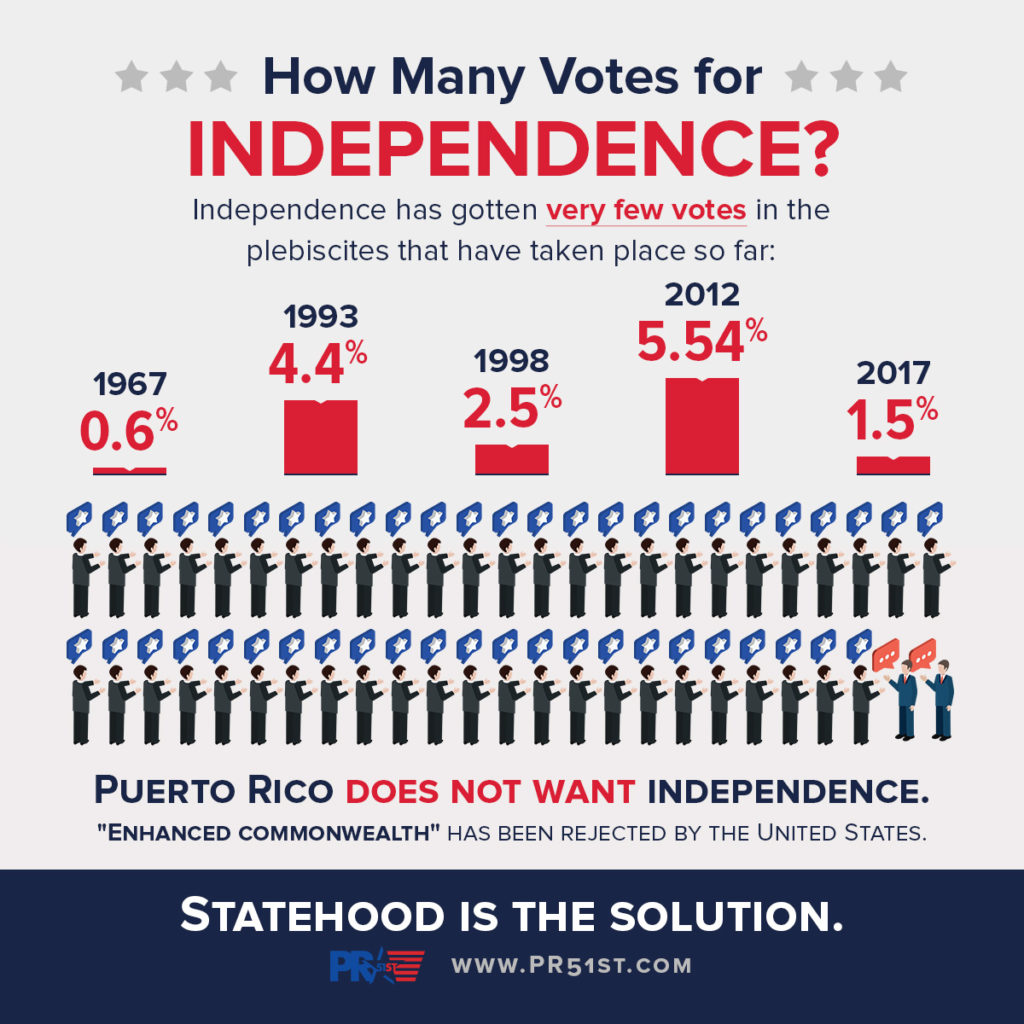There are three possible status options for Puerto Rico under the U.S. constitution:
- Puerto Rico can become a state, as 37 other territories have already done.
- Puerto Rico can become an independent nation, as the Philippines has already done.
- Puerto Rico can continue as a territory, under the plenary power of Congress.
There is controversy over the territorial option, because some people believe that Congress can and will negotiate a special “free beer and barbecue” option for Puerto Rico. We don’t think that will happen. All three branches of the federal government have rejected it repeatedly. But independence is a possibility. In fact, Puerto Rico, as an unincorporated territory, clearly has the legal option of becoming an independent nation.
Independence would be an honorable option, and it would mean the end of the colonial relationship between the United States and Puerto Rico. There is just one thing wrong with independence for Puerto Rico.
As the infographic below shows, Puerto Rico has voted against independence over and over. The proportion of Puerto Ricans who support independence is smaller than the proportion of people in the states who vote for the Libertarian party in presidential elections. 5.54% is the largest percentage of votes independence has ever received, and most votes have been at 2% or less. There has not been an increase in support for independence over time.
Congress could legally force independence on Puerto Rico. That is the only route to independence.
What about free association?
In 2017, the Department of Justice said it was concerned about separating independence and free association. They worried that “voters may misperceive this difference to suggest that Free Association is an ‘enhanced Commonwealth’ option, when the reality is that both choices would result in complete and unencumbered independence and both would require an assessment of a variety of issues related to citizenship.”
Free Association is not another way of gaining sovereignty and yet maintaining the relationship with the United States. It would not be a sure way to keep U.S. citizenship and financial support from the U.S. while also having freedom to negotiate with other nations.
It is, as the Department of Justice said, “complete and unencumbered independence.”
Javier A. Hernandez, the author of Prexit, a book supporting free association, says that “With Free Association, Puerto Rico would not obtain full independence.” Here he clearly disagrees with the U.S. Department of Justice, which calls Free Association “complete and unencumbered independence.”
Hernandez goes on, a few pages later in his book, to say “A Treaty of Free Association would grant Puerto Rico its own sovereignty, inserting it into the international community as a sovereign nation with full political dignity.” In other words, it would make Puerto Rico an independent nation.
The Treaty of Free Association Hernandez imagines includes “inexorable” U.S. citizenship, free travel, and continued payments of Social Security and other benefits. Of course, the “free” part of Free Association means that the U.S. can change or withdraw from the deal at any time, just as Puerto Rico could. The current Compacts of Free Association the U.S.participates in have changed repeatedly over time.
The DOJ is right in saying that voters could be confused into believing that Free Association is “enhanced commonwealth” — repeatedly rejected by all three branches of the U.S. government. It appears, in fact, that people like Hernandez are intentionally trying to confuse voters on this point. While Prexit acknowledges that the “commonwealth” option is in fact the territorial option, Hernandez attempts to show that Free Association is essentially identical to the “commonwealth” option he disdains.
Leave it to the voters
As we have seen, Puerto Rico voters do not vote for independence. There has never been a pro-independence governor, and independence bills in Congress have never been supported by Puerto Rico.
Pro-independence apologists claim that U.S. suppression and persecution have led to the tiny number of votes for independence. We have more respect for Puerto Rico voters than that.








No responses yet